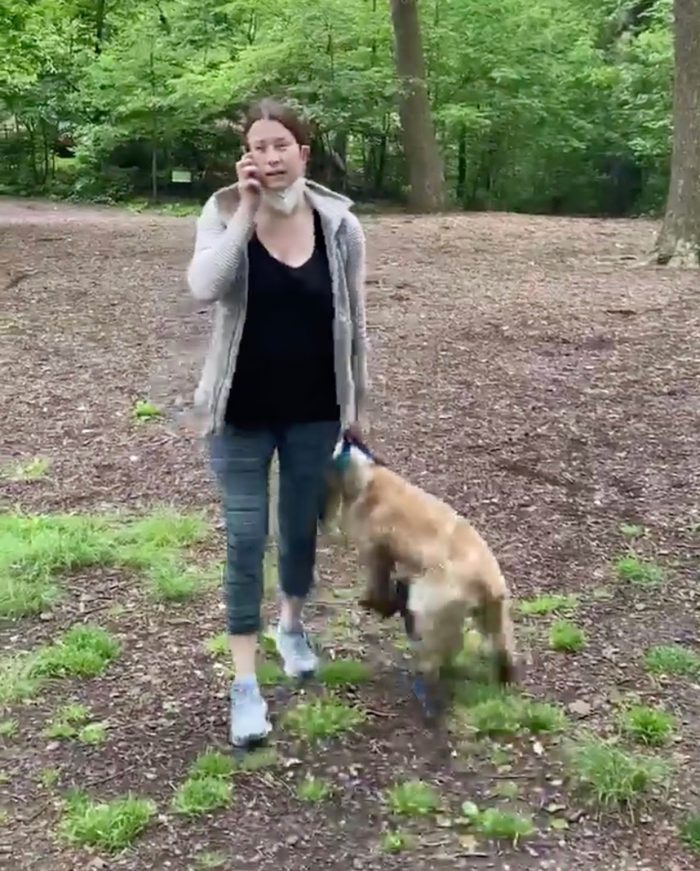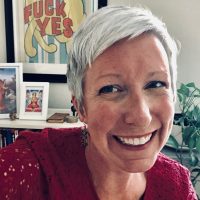Read this next: Our Silence is our Violence—& I Won’t be Quiet Anymore.
Dear white girlfriends,
I was disgusted when I saw the video of the racist outburst by a white woman named Amy Cooper in Central Park, weren’t you?
Outraged.
She is seen in the video dialing the police and proclaiming, “I’m going to tell them there’s an African American man threatening my life.”
This, as we all know now, was an outright lie.
Christian Cooper—the shared surname is a coincidence—was bird-watching, and asked Amy to leash her dog, as is required in that part of the park.
Instead of complying with his request to follow the rule of law, she became enraged. She lashed out in a way that could have cost Christian his life.
And we all know by now that’s not hyperbole.
As if to underscore the danger in which Amy placed Christian in that moment, there in the news was the murder of George Floyd. By police. In broad daylight. As onlookers recorded video.
Police have a long history of violence against black men.
And so do white women.
Maybe white America first considered this after the brutal 1955 lynching of Emmett Till, the 14-year-old black boy beaten, tortured, and shot for the crime of flirting with a white woman, Carolyn Bryant. Years later, Bryant admitted she’d lied about his advances.
This same sort of violence by white women against black men is the theme of one of the great American novels, Harper Lee’s To Kill a Mockingbird. Tom Robinson, a black man, is falsely accused of rape by a woman whose family is considered “white trash” in town. He is convicted, tries to escape imprisonment, and is shot and killed.
To Kill a Mockingbird was published in 1960, set in the Depression era, yet tells a story as old as this nation.
We are a nation built by slave labor on land stolen from its indigenous people. Our history of patriarchy and misogyny further complicate matters. Certainly, in the course of history, white women have also been subject to violence: physical, sexual, psychological. Perhaps it is human nature when feeling disenfranchised to lash out at a safe target. Perhaps that safe target always will be someone more disenfranchised than oneself.
Today, we live with a president who has created a climate in which hatred and white nationalism have come out of the darkness into the open, emboldened. White women helped put him in the White House. Whether you believe the exit poll number Donald Trump likes to tout (52%), or the actual statistic put forth by the Pew Research Center (47%), it is a significant number, particularly when weighed against the 45% of white women who voted for Hillary Clinton.
Given a choice between gender and whiteness, an alarming number of white female Americans effectively cast their vote in favor of whiteness.
Because let’s consider the real meaning of Make America Great Again: the “great” America to which Trump supporters seek a return was a world in which white males dominated. Anyone marginalized—people of color, LGBTQ individuals, immigrants, and yes, women—had to live in constant fear of how white men might choose to infringe upon their freedoms, abuse their bodies, or even kill them.
And when we see how marginalized people are treated in this country daily, one can almost understand the subconscious drive of white women to betray their gender and align with white men.
Put that together with the historical construct we have in this nation that paints black men as savages to be feared (a construct, by the way, that was created by white slave owners to keep their women to themselves, even as they raped black women with impunity), and it is a recipe for violence.
Violence which white women can commit without a thought.
Yes, I was disgusted when I saw the video of Amy Cooper’s behavior in Central Park.
I was outraged.
I wanted to disown her, to condemn her, to believe there was no chance she and I were at all alike.
But I was also, ultimately, uncomfortably aware that she is the poster child for my own white privilege.
I didn’t choose the skin into which I was born any more than anyone else ever does. I don’t want white privilege. I don’t want race to override humanity.
But this is the world in which we live, born of a long history of inequality and brutality, and unless I acknowledge my privilege—unless I assume the responsibility that goes along with it—I will be Amy Cooper.
Ignorant. Reactive. Capable of destroying someone else’s life with a single phone call.
I’d like to think that I am mindful enough to never make the kind of hateful call Amy Cooper made.
But that is the insidious thing about something like white privilege, isn’t it?
If I don’t know I have it, and if in my personal interactions with police I’ve found them to be respectful and law-abiding, it might not occur to me that calling them could cost a person his life.
Amy Cooper’s words on that video indicate that she knew exactly what she was doing by invoking fear of attack by an African American man. Luckily, Christian Cooper is alive today. The police were slow to respond, so we didn’t have to find out how that interaction might have gone. The murder of George Floyd, however, and so many murders before his, suggest luck is all a man of color can hope for when a white woman calls the police.
And so, I must be honest with myself about what I see when I look in the mirror now: I see privilege.
Dear white girlfriends, can you take that hard look in the mirror along with me?
Worth a look as well: An Open Apology to All African Americans.
AUTHOR: K.C. WILDER
IMAGE: PHOTO BY CHRISTIAN COOPER VIA ASSOCIATED PRESS


No comments:
Post a Comment